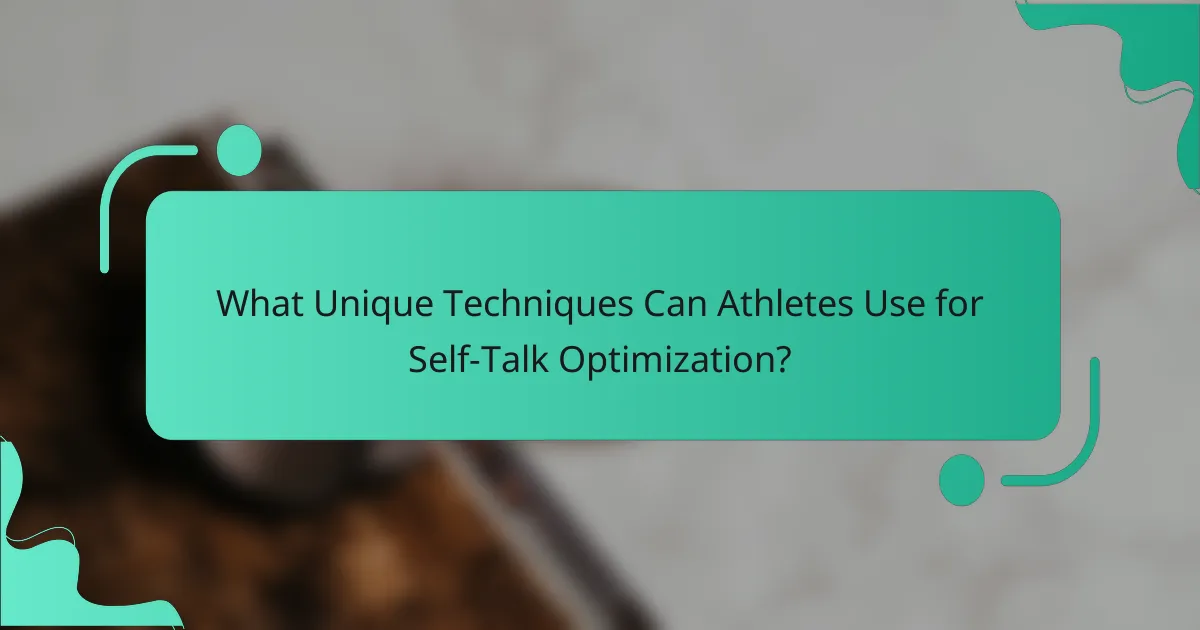Cultivating positive self-dialogue is essential for athletes seeking peak performance and mental resilience. This article explores strategies like affirmations, visualization, and mindfulness to enhance focus and reduce anxiety. It also addresses common self-talk mistakes and offers techniques to foster a supportive environment. By implementing these practices, athletes can improve their mental framework and achieve consistent success.

What is Positive Self Dialogue and Why is it Important for Athletes?
Positive self-dialogue is a mental strategy that enhances athletes’ performance and resilience. It fosters a positive mindset, which can lead to improved focus, confidence, and motivation during training and competition. Athletes who engage in positive self-talk can better manage stress and overcome setbacks, contributing to overall mental well-being. Research indicates that athletes using positive self-dialogue experience lower anxiety levels and higher self-efficacy, essential for peak performance. By cultivating this practice, athletes can develop a stronger mental framework, ultimately leading to consistent success in their sports.
How Does Self-Talk Influence Athletic Performance?
Positive self-talk significantly enhances athletic performance by boosting confidence and focus. Athletes can cultivate this dialogue through specific techniques. Visualization, affirmations, and mindfulness practices help athletes reframe negative thoughts. Studies show that positive self-talk can increase endurance and reduce perceived exertion during training and competition. By consistently practicing these techniques, athletes develop mental resilience, enabling them to overcome challenges and perform at their peak.
What Are the Psychological Benefits of Positive Inner Dialogue?
Positive inner dialogue enhances mental resilience and peak performance in athletes. It fosters self-confidence, reduces anxiety, and promotes focus. Research shows that athletes who engage in positive self-talk experience improved performance metrics and greater emotional regulation. This dialogue can include affirmations and constructive feedback, reinforcing a growth mindset. As a result, athletes develop a more adaptive approach to challenges, leading to sustained motivation and better outcomes in competitive environments.

What Are the Universal Strategies for Cultivating Positive Self-Talk?
To cultivate positive self-talk, athletes should adopt strategies that enhance mental resilience and peak performance. Key techniques include practicing affirmations, visualizing success, and reframing negative thoughts into constructive feedback.
Engaging in daily affirmations can reinforce self-belief and confidence, while visualization helps athletes mentally prepare for challenges. Reframing involves recognizing negative thoughts and converting them into motivating statements.
Research shows that consistent positive self-talk can lead to improved performance metrics and greater emotional stability. Athletes who implement these strategies often report enhanced focus and reduced anxiety during competitions.
Incorporating mindfulness practices can further support positive self-dialogue, allowing athletes to remain present and centered. Regular reflection on personal achievements can also reinforce a positive mindset and foster resilience.
How Can Visualization Techniques Enhance Self-Talk?
Visualization techniques can significantly enhance self-talk by creating a mental framework for positive dialogue. Athletes can use imagery to visualize success, which reinforces confidence and motivation. This practice cultivates a unique attribute of mental resilience, allowing athletes to overcome challenges. As a result, visualization aligns thoughts with desired outcomes, promoting peak performance. Regular use of these techniques can lead to lasting changes in self-perception and internal dialogue.
What Role Does Affirmation Play in Building Mental Resilience?
Affirmation plays a crucial role in building mental resilience by fostering positive self-dialogue. This practice enhances athletes’ self-belief, enabling them to overcome challenges and maintain focus. Research indicates that consistent affirmations can reduce anxiety and improve performance under pressure, providing a unique psychological advantage. By integrating affirmations into their training routines, athletes cultivate a resilient mindset, which is essential for peak performance.
What Are Effective Affirmation Examples for Athletes?
Effective affirmations for athletes focus on enhancing self-belief and mental resilience. Examples include “I am strong and capable,” “I trust my training,” and “I perform at my best under pressure.” These statements reinforce a positive self-dialogue, crucial for peak performance. Athletes can personalize affirmations to reflect their unique goals and challenges, deepening their impact. Consistent practice of these affirmations fosters a growth mindset, enabling athletes to overcome obstacles and maintain focus.
How Can Goal Setting Improve Self-Dialogue?
Setting specific goals enhances self-dialogue by providing clarity and focus. Athletes who set measurable objectives develop a positive internal narrative that reinforces their commitment and resilience. This structured approach cultivates motivation and reduces negative self-talk. Research indicates that goal-oriented self-dialogue can improve performance by 20%. Additionally, athletes using this technique report higher mental resilience, enabling them to overcome challenges effectively.

What Unique Techniques Can Athletes Use for Self-Talk Optimization?
Athletes can optimize self-talk using techniques like visualization, affirmations, and mindfulness. Visualization involves mentally rehearsing successful performances, enhancing confidence and focus. Affirmations are positive statements that reinforce self-belief and resilience, helping athletes overcome doubts. Mindfulness practices, such as meditation, promote awareness of thoughts, allowing athletes to replace negative self-talk with constructive dialogue. These unique techniques foster mental resilience and peak performance.
How Does Mindfulness Practice Enhance Inner Dialogue?
Mindfulness practice enhances inner dialogue by promoting self-awareness and reducing negative thoughts. Athletes who engage in mindfulness techniques experience improved focus, emotional regulation, and resilience. Research shows that mindfulness can decrease performance anxiety and increase confidence, leading to better outcomes. By fostering a positive self-dialogue, athletes can maintain motivation and enhance their mental toughness during competition.
What Are the Benefits of Journaling for Athletes’ Self-Talk?
Journaling enhances athletes’ self-talk by promoting positive mental frameworks. This practice fosters self-awareness, enabling athletes to identify negative thoughts and replace them with constructive affirmations. Research indicates that athletes who journal experience improved focus and emotional regulation, leading to enhanced performance. Additionally, journaling serves as a tool for reflection, allowing athletes to analyze their experiences and set future goals, thus reinforcing a growth mindset.

What Are the Rare Attributes of Effective Self-Talk in Competitive Settings?
Effective self-talk in competitive settings incorporates rare attributes such as specificity, adaptability, and emotional regulation. Specificity allows athletes to create targeted affirmations that address unique challenges. Adaptability enables self-talk to evolve based on performance feedback, fostering resilience. Emotional regulation helps manage anxiety and maintain focus, enhancing overall performance. These attributes contribute to a more effective mental strategy for athletes aiming for peak performance.
How Can Athletes Use Self-Talk to Manage Performance Anxiety?
Athletes can effectively use self-talk to manage performance anxiety by cultivating positive internal dialogue. This practice enhances focus, boosts confidence, and mitigates stress during competitions.
Positive self-talk involves affirmations and motivational phrases that reinforce an athlete’s abilities. For instance, repeating statements like “I am prepared” or “I can overcome challenges” can shift mindset and promote resilience. Research indicates that athletes who engage in constructive self-talk experience lower anxiety levels and improved performance outcomes.
Implementing structured self-talk techniques, such as visualization combined with affirmations, can further enhance mental resilience. Athletes can visualize successful performances while simultaneously using positive phrases to reinforce their capabilities. This dual approach strengthens mental preparation and fosters a more confident mindset.
Regular practice of self-talk techniques, especially during training sessions, can help athletes internalize positive messages. By consistently reinforcing their strengths, athletes can build a robust mental framework that supports peak performance in high-pressure situations.
What Unique Self-Talk Strategies Are Used by Elite Athletes?
Elite athletes use unique self-talk strategies to enhance performance and mental resilience. These strategies include affirmations, visualization, and reframing negative thoughts. Affirmations involve repeating positive statements to build confidence. Visualization helps athletes mentally rehearse their performance, creating a sense of familiarity and control. Reframing negative thoughts allows them to transform potential setbacks into motivational challenges. By integrating these techniques, athletes cultivate a mindset conducive to peak performance.

How Can Athletes Measure the Impact of Self-Talk on Performance?
Athletes can measure the impact of self-talk on performance through self-assessment and objective metrics. Tracking changes in performance, mood, and focus before and after self-talk interventions provides insights into effectiveness.
For instance, athletes can maintain a performance journal to document thoughts and outcomes. They can also use wearable technology to analyze physiological responses during training sessions. Studies show that positive self-talk correlates with improved performance metrics, such as increased endurance and reduced anxiety levels.
Additionally, implementing structured self-talk strategies, like visualization and affirmations, can enhance mental resilience. Athletes should evaluate the consistency of these practices and their influence on competitive outcomes.
What Metrics Can Be Used to Assess Self-Talk Effectiveness?
To assess self-talk effectiveness, athletes can utilize metrics such as emotional state, performance outcomes, cognitive clarity, and resilience levels. These metrics provide insights into how positive self-dialogue influences mental resilience and peak performance.
| Metric | Description |
|———————–|————————————————-|
| Emotional State | Measures feelings before and after performance |
| Performance Outcomes | Compares results against personal bests |
| Cognitive Clarity | Assesses focus and decision-making during events |
| Resilience Levels | Evaluates ability to bounce back from setbacks |
How Can Feedback Loops Improve Self-Talk Practices?
Feedback loops significantly enhance self-talk practices by providing real-time insights into performance and mindset. By regularly assessing and adjusting self-dialogue, athletes can cultivate a more positive and constructive internal narrative. This iterative process allows for the identification of negative thought patterns and the reinforcement of empowering beliefs. As a result, athletes experience improved mental resilience, enabling them to face challenges more effectively. Incorporating feedback loops in training routines fosters a growth mindset, which is crucial for peak performance.

What Common Mistakes Do Athletes Make in Their Self-Talk?
Athletes often make mistakes in self-talk that hinder performance. Common errors include negative self-talk, unrealistic expectations, and comparison with others. These patterns can create anxiety and diminish confidence. To cultivate positive self-dialogue, athletes should focus on affirmations, set realistic goals, and practice mindfulness. By replacing negative thoughts with constructive ones, they enhance mental resilience and optimize performance.
How Can Negative Self-Talk Be Identified and Reframed?
Negative self-talk can be identified through self-awareness and mindfulness techniques. Athletes should monitor their internal dialogue and recognize patterns of negative thoughts. Reframing involves consciously replacing these thoughts with positive affirmations and constructive feedback. This practice enhances mental resilience and supports peak performance. Techniques such as visualization and positive self-affirmation can effectively facilitate this reframing process.

What Are the Best Practices for Sustaining Positive Self-Talk?
To sustain positive self-talk, athletes should practice consistent affirmations, visualize success, and maintain a growth mindset. Regularly reflecting on achievements enhances self-confidence and resilience. Incorporating mindfulness techniques can also help in recognizing and reframing negative thoughts. Engaging with supportive peers fosters an environment that encourages positive dialogue.
How Can Athletes Create a Personalized Self-Talk Plan?
Athletes can create a personalized self-talk plan by identifying specific goals and crafting tailored affirmations. Begin by assessing performance areas needing improvement. Next, develop positive phrases that reinforce confidence and focus on these during training and competition. Regular practice enhances mental resilience and peak performance.
What Expert Insights Can Help Athletes Optimize Their Inner Dialogue?
Athletes can enhance their performance by fostering positive self-dialogue, which builds mental resilience. Techniques include visualization, affirmations, and mindfulness. Visualization helps athletes imagine success, while affirmations reinforce a positive mindset. Mindfulness practices reduce anxiety, allowing for focused performance. Research indicates that athletes using these techniques report improved confidence and reduced stress levels.
